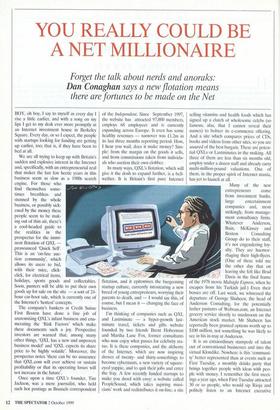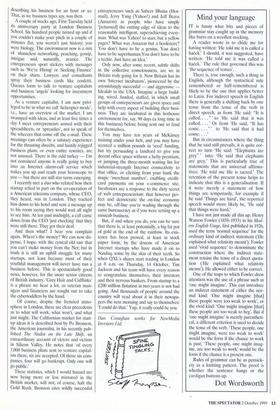YOU REALLY COULD BE A NET MILLIONAIRE
Forget the talk about nerds and anoraks: Dan Conaghan says a new flotation means there are fortunes to be made on the Net
BOY, oh boy, I say to myself as every day I rise a little earlier, and with a song on my lips I get to my desk ever more promptly at an Internet investment house in Berkeley Square. Every day, or so I expect, the people with startups looking for funding are getting up earlier, too; that is, if they have been to bed stall.
The company's bankers at Credit Suisse First Boston have done a fine job of anatomising 'QXL's infant business and enu- merating the 'Risk Factors' which make these documents such a joy. Prospective investors are warned that, among many other things, 'QXL has a new and unproven business model' and 'QXL expects its share price to be highly volatile'. Moreover, the prospectus notes 'there can be no assurance that QXLcom will ever achieve or sustain profitability or that its operating losses will not increase in the future'.
Once upon a time QXL's founder, Tim Jackson, was a mere journalist, who held such hot postings as Brussels correspondent of the Independent. Since September 1997, the website has attracted 97,000 members, employs 68 employees and is currently expanding across Europe. It even has some healthy revenues — turnover was £1.2m in its last three months reporting period. How, I hear you wail, does it make money? Sim- ple: from the margin on the goods it sells, and from commissions taken from individu- als who auction their own clobber.
In many ways, QXL's flotation, which will give it the dash to expand further, is a bell- wether. It is Britain's first pure Internet
• 7-71 "="-Z, flotation, and it epitomises the burgeoning startup culture, currently intoxicating a new breed of young entrepreneurs, worrying their parents to death, and — I would say this, of course, but I mean it — changing the face of business.
I'm thinking of companies such as QXL and Lastminute — a hyper-growth last- minute travel, tickets and gifts website founded by two friends Brent Hoberman and Martha Lane Fox, former consultants who now enjoy what passes for celebrity sta- tus. It is these companies, and the alchemy of the Internet, which are now inspiring droves of twenty- and thirty-somethings to become cybernauts, a new variety of square- eyed yuppie, and to quit their jobs and enter the fray. A few recently funded startups to make you drool with envy: a website called PeopleSound, which takes aspiring musi- cians' work and redistributes it on-line; a site selling vitamins and health foods which has signed up a clutch of wholesome celebs (so famous, alas, that I cannot reveal their names) to bolster its c-commerce offering. And a site which compares prices of CDs, books and videos from other sites, so you are assured of the best bargain. These are poten- tial QXLs or Lastminutes in the making. All three of them are less than six months old, employ under a dozen staff and already carry multi-million-pound valuations. One of them, in the proper spirit of Internet mania, has yet to launch at all.
Many of the new entrepreneurs come from investment banks, large entertainment companies and, most strikingly, from manage- ment consultancy firms. Whatever Anderson, Bain, McKinsey and Boston Consulting Group do to their staff, it's not engendering loy- alty. They are haemor- rhaging their high-flyers. (One of these told me the other day that on leaving she felt like Brad • Davis in the final frame of the 1978 movie Midnight Express, when he escapes from his Turkish jail.) Even their bosses are off. Last week, we witnessed the departure of George Shaheen, the head of Anderson Consulting, for the potentially lusher pastures of Webvan.com, an Internet grocery service shortly to mushroom on the American stock market. Mr Shaheen has reportedly been granted options worth up to $100 million, not something he was likely to see in his in-tray at Anderson.
It is an extraordinary stampede of talent out of conventional businesses and into the virtual Klondike. Nowhere is this 'communi- ty' better represented than at events such as First Tuesday, a monthly drinks party that brings together people with ideas with peo- ple with money. I remember the first meet- ings a year ago, when First Tuesday attracted 30 or so people, who would sip Rioja and politely listen to an Internet executive describing his business for an hour or so. That, as we business types say, was then.
A couple of weeks ago, First Tuesday held Its anniversary party at London Business School. Six hundred people turned up and if YOU couldn't make your pitch in a couple of minutes tlat, you weren't just history; you were biology. The environment now is a mix of shameless networking, poaching, gossip, intrigue and, naturally, avarice. The entrepreneurs sport stickers with messages such as 'We're Hiring' or 'Seeking Finance' on their shirts. Lawyers and consultants
spray their business cards like confetti. Queues form to talk to venture capitalists rind business 'angels' looking for investment opportunities.
As a venture capitalist, I am now privi- leged to be in what we call 'helicopter mode', i.e., have an overview of the market. I am swamped with ideas, and at least five times a day 1 meet entrepreneurs armed with their spreadsheets, or `spreadies', not to speak of the wheezes that come off the e-mail. These meetings can often be a salutary experience for the thrusting dweebs, and hastily rejigged business plans, or even entire rewrites, are not unusual. There is the odd turkey — I'm not convinced anyone is really going to buy into an Internet alarm-call service which wakes you up and reads your horoscope to you — but there are still star turns emerging.
I recently met a duo who related how their startup relied in part on the co-operation of a American telecoms company, whose CEO, they heard, was in London. They tracked him down to his hotel and sent a message up to his room saying they would wait all night to see him. At ten past midnight, a call came down from the CEO 'just checking' that they were still there. They got their deal.
And then what? I hear you complain again. Where's the money? We can now dis- pense, I hope, with the cynical old saw that you can't make money from the Net; but in truth it is still an uphill struggle for many startups, not least because most of their youthful management will never have run a business before. This is spectacularly good news, however, for the more senior citizens of British industry. 'Grey Hair and Cufflinks' is a phrase we hear a lot, as veteran man- agers and financiers are sought out to take the cybertoddlers by the hand.
Of course, despite the frenzied atmo- sphere in London, there are clear precedents as to what will work, what won't, and what just might. The Californian market for start- up ideas it is described best by Po Bronson, the American journalist, in his recently pub- lished The Nudist on the Late Shift, an extraordinary account of victors and victims in Silicon Valley. He notes that 'of every 1,000 business plans sent to venture capital- ists there, six are accepted. Of those six com- panies, four will go bankrupt. Only one will go public.'
These statistics, which I would hazard are now being more or less mirrored in the British market, will not, of course, halt the Gold Rush. Bronson cites wildly successful entrepreneurs such as Sabeer Bhatia (Hot- mail), Jerry Yang (Yahoo!) and Jeff Bezos (Amazon) as people who have simply ireturned] the cutting edge of ideas to the reasonably intelligent, superachieving every- man. What was Yahoo! to start, but a yellow pages? What was Amazon but a bookstore? You don't have to be a genius. You don't have to be superhuman.You don't have to be a techie. Just have an idea.'
Only now, after some recent, subtle shifts in the collective consciousness, are we in Britain truly going for it. Now Britain has its own 'Internet incubators', pioneered by the astonishingly successful — and aggressive — Idealab in the USA. Imagine a large build- ing, wired, funded, staffed, in which small groups of entrepreneurs are given space and help with every aspect of building their busi- ness. They are incubated in this hothouse environment for, say, 90 days (a long time in this business) before being sent out to fend for themselves.
You may have ten years of McKinsey training under your belt, and you may have secured a million pounds in `seed' funding, but try persuading a landlord to give you decent office space without a hefty premium, or jumping the three-month waiting list for industrial-strength Internet connectivity to that office, or eliciting from your bank the magic 'merchant number', enabling credit- card payments on your e-commerce site. Incubators are a response to the dirty secret of web entrepreneurism: that however per- fect and democratic the on-line economy may be, off-line you're wading through the same bureaucracy as if you were setting up a minicab business.
But, if and when you do, you can be sure that there is, at least potentially, a big fat pot of gold at the end of the rainbow. Its exis- tence has been proved, at least in stock paper form, by the dozens of American Internet startups who have made it on to Nasdaq, some by the skin of their teeth. So when OXL's shares start trading in London at 8 a.m. on Thursday, 14 October, Tim Jackson and his team will have every reason to congratulate themselves, their investors and their nervous bankers. From startup to a E200 million flotation in two years is not bad going. And thousands of people around the country will read about it in their newspa- pers the next morning and say to themselves: 'I could do that.' Yup, it really could be you.











































































 Previous page
Previous page